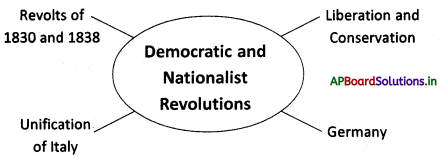Students can go through AP State Board 9th Class Social Studies Notes Chapter 14 Democratic and Nationalist Revolutions 19th Century to understand and remember the concept easily.
AP State Board Syllabus 9th Class Social Studies Notes Chapter 14 Democratic and Nationalist Revolutions 19th Century
→ The democratic and nationalist movements led to the emergence of the nation-state in place of the multinational dynastic empires of Europe.
→ European countries were under autocratic monarchies within the territories of which lived diverse people. They belonged to different ethnic groups, spoke different languages.
→ Socially and politically a lauded aristocracy was the dominant class on the continent. But due to access to education and industrialization a new middle class had emerged.
→ The term “Liberalism” derives from the Latin root “Liber” meaning free. Liberalism insists on freedom in different aspects.
→ Conservatives believed in the establishment of traditional institutions of state and society.
→ In 1815 representatives of the European powers collectively defeated Napolean, met at Vienna to draw up a settlement for Europe.
→ Europe witnessed two revolutions one in 1830 and another in 1848 which occurred during the reign of Charles X and Louis Philippe respectively. Both of them were forced to abdicate.
![]()
→ The nationalist feeling was widespread in Germany and finally, Germany was united under the leadership of Otto von Bismarck.
→ Italy too had a long history of political fragmentation. Sardinia – Piedmont State took the lead and United Italy. Mazzini, Garibaldi, Cavour played important roles. Victor Emmanuel II was proclaimed king of United Italy.
→ Despotism: Despotism is a cruel and unfair government by a ruler or rulers who have a lot of power.
→ Nationalism: 1. Love and respect for his country. 2. The desire by a group of people of the same race, religion, origin, etc., to form an independent country.
→ Liberalism: It is a political philosophy that insists on freedom in all aspects.
→ Bureaucracy: It is an administrative system operated by a large number of officials.
→ Romanticism: Romanticism is the cultural movement of the 18th and 19th centuries which was concerned with the expression of an individual’s feelings and emotions.
![]()
→ New middle class: A new social group, who had access to education and new ideas and got jobs due to industrialization and commercialization, were called the New Middle class during the 18th and 19th centuries.
